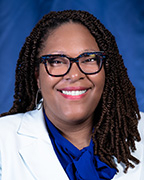Addiction Psychiatry
Addiction Psychiatry
Our Mission
To be a leader in clinical care for individuals with substance use and co-occurring mental health disorders, backed by innovative translational research, new digital therapeutics, and comprehensive multidisciplinary training.
Addiction psychiatry at the University of Rochester Medical Center has provided expert clinical care in the treatment of substance use disorders for more than 50 years.
As a regional leader, we are committed to continuously innovating our clinical services. We adapt to the ever-evolving landscape of addiction treatment by developing progressive treatment models that meet the needs of our diverse community.
Strong Recovery is the primary outpatient clinical service for Addiction Psychiatry known nationally for clinical excellence, system leadership in addiction treatment, and our engaging, inclusive, and wellness-oriented work environment.
Addiction psychiatry addresses the distinct needs of patients throughout their lifespan, offering early interventions for adolescents and young adults by building partnerships with primary care practices in rural, suburban, and urban settings.
Patient Care
We are committed to interdisciplinary collaboration and partnering with patients and their families to provide care that is accessible and individualized.
Strong Recovery
Outpatient Chemical Dependency Services
Our nationally recognized Outpatient Chemical Dependency Services facilitate recovery from addiction and co-occurring disorders through an integrated, highly skilled, multidisciplinary team of providers.
Adolescent and Young Adult Rehabilitation Program
The Finger Lakes’ first Adolescent and Young Adult Rehabilitation Program for young adults (AYA) is a Certified Community Behavioral Health Clinic (CCBHC) that provides an integrative model of care for young adults with substance use disorders.
Opioid Treatment Program
Embedded in Strong Recovery our OTP accrediated Opioid treatment program provides mental health services and medications for opioid use disorder. The program provides free opioid overdose prevention tranining for families and community members.
Substance Use in Primary Care (SUD—PC)
The SUD-PC program offers collaborative services with the patient’s primary care provider. The program assesses and connects patients to appropriate care and provides access to Strong Recovery services or their primary care office.
Sobriedad Fuerte at Strong Recovery
Strong Recovery offers services in Spanish to meet the unique needs of our Latino population with a primary substance use disorder and/or co-occurring disorders.
Education, Training and Research
Using Translational Science and Innovations in Technology to Improve Patient Care & Train the Next Generation of Clinical Leaders.
Education and Training
Our programs train healthcare professionals to deliver high-quality, equitable, evidence-based care to patients of all ages with substance use disorders and co-occurring psychiatric conditions. We use Digital Treatments (DTxs), Digital Tools, Virtual Reality and 3-D Simulation Techniques to train the next generation of clinical leaders within Addiction Psychiatry.

Addiction Psychiatry Fellowship
The 12-month ACGME-accredited program prepares fellows to provide equitable, evidence-based clinical care to patients with substance use disorders and co-occurring psychiatric conditions. Fellows are immersed in the robust Strong Recovery clinical team and a supportive educational community while training to deliver outstanding clinical care in addiction psychiatry.

Advanced Certificate Program in Addictions Counseling
Designed in collaboration with faculty from the University of Rochester’s Medical Center and Strong Recovery, this program provides additional substance use training to health professionals to attain their Credentialed Alcoholism and Substance Abuse Counselor (CASAC) certification.
APA Accredited Predoctoral Clinical Psychology Internship Training Program w/in Addiction Psychiatry
URMC Addiction Treatments and Translational Science at Strong Recovery
Interns in the University of Rochester Medical Center (URMC)'s Addiction Forensic Clinical Research at Strong Recovery Track will focus their time on developing expertise in translational clinical research. Interns are integrated into a multidisciplinary team of providers, collaborating closely with psychiatrists, substance use counselors, psychologists, and other clinicians. Interns conduct both individual and group therapy with clients experiencing co-occurring substance use and mental health disorders. Interns conduct psychological and neurocognitive testing to aid in diagnostic clarity and help shape treatment plans tailored to the needs of each client.
Read more about the Internship Training Program
Clinical activities utilize advanced interactive healthcare technologies to provide evidence based behavioral health care. Interactive technologies include digital assessments and behavior tracking/wearable technology tools, interactive digital health care intervention platforms (e.g., a User Friendly, Customizable Avatar Assisted CBT Platform [RITch®CBT], 3D Organ Simulation Tools for Motivational Interviewing, Virtual Reality Mindfulness Tools). Under the supervision of a licensed clinical psychologist, interns may complete court-ordered competency to stand trial assessments and mental health evaluations (e.g., Mental Health and Drug Court Evaluations). The internship offers both didactic and supervisory experiences focused on the etiology of substance use and violent behavior within the context of empirically supported interventions. Research activities also include using the digital tools with wearable biosensor research, biomarker research, and tele-health services. Interns will make meaningful contributions to ongoing research projects, including developing and submitting manuscripts for publication using existing data sets, assisting with federally funded randomized controlled trials evaluating treatments for comorbid substance use disorders and aggression, and analyzing dyadic data from couples in alcohol manipulation studies, as well as EMA data exploring the proximal relationships between substance use and aggression.
Our Research
Combining cognitive-behavioral therapies with digital tools strengthens our programs for patients, scientists, and learners as we collaborate with the NIH and FDA to develop evidence-based digital solutions for clients with addiction and co-occurring mental health disorders. UR Medicine’s nationally recognized Recovery Center of Excellence is leading the way in addiction prevention strategies while partnering with rural communities across the country to increase support and prevent opioid overdoses.

Easton Lab: SUDs and Co-Occurring Behavioral Health, Digital Treatments, AI, Biomarker Research and Wearable Technologies
Dr. Easton has been the PI and Co-I on NIH-funded RO1s, Center Grants, and UGUH3 grant mechanisms.
Read more about the Easton Lab
Dr. Easton has received numerous funding support from the Department of Human Health Services, including Rural Health Prevention and Treatment Grants (RCORP), Training Predoctoral Training Interns (GPE and BHWET), numerous foundation grants (Patrick Lee, McGowan, Donaghue, Byrne), Criminal Justice Grants (DHMAS Forensic Diversionary Grants) and more recently, Department of Defense Grants. Her primary translational clinical research interests are in: 1) development and deployment of Digital Therapeutics (DTXs) & randomized controlled trials designed to improve treatment outcomes among clients with addiction, trauma, other behavioral health diagnoses and medical comorbidities; 2) biomarker research designed to inform DTXs and treatment outcomes within the addiction and psychiatric field; 3) wearable technology designed to inform the continuous screening and monitoring of behavioral health and addiction symptoms and; 4) the use of AI with DTXs and wearable technology as a method to prevent psychiatric decompensation as well as prevent substance use relapse.

UR Medicine Recovery Center of Excellence
The Recovery Center of Excellence is working to prevent and reduce the impact of substance use and substance use disorder (SUD) in rural areas nationwide by building and sharing an array of evidence-based practices that meet the needs of rural communities by partnering with organizations that serve rural areas to apply best practices to local efforts.






